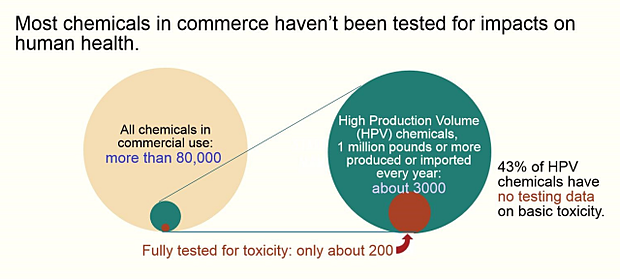
Chemical Environment
Chemicals are of course all around us and in us: everything in the universe, including the human body, is made of chemicals. Some chemicals, however, can undermine human health and development.
Concerns about certain chemicals, such as arsenic, lead and mercury go back millennia. Other naturally occurring chemicals, such as asbestos, have raised concerns more recently because they are used in materials and products in ways that increase human exposure and can lead to health problems.
Beginning in the late 19th century and accelerating during and after World War II, humankind significantly increased production of synthetic chemicals, driven in part by the petrochemical industry's lead in technology and innovation. Since then, tens of thousands of chemicals have become available on the market worldwide. Most have never been tested for human health impacts.
As concerns about adverse health effects of some chemicals have been raised, researchers have investigated potential links between exposures and different diseases and disabilities. Mounting research indicates that the health risks of exposure may far outweigh the benefits we derive from using some of these chemicals.
Through the links to the right, you'll find information on some of the chemicals and classes of chemicals that have been most studied for possible health impacts. This is a small slice of the approximately 3000 high productive volume (HPV) chemicals now on the market—those produced in or imported into the United States in quantities of 1 million pounds or higher.

Our 2011 Toxicant and Disease Database summarizes the state of evidence about links between dozens of diseases and hundreds of toxicants, including many not listed here. You'll find links in the Dig Deeper section at the right to further chemical databases.
By staying attuned to CHE's newsfeed and ScienceServs, you can learn more about the rapidly emerging new science on these and other chemicals and our evolving understanding of how they affect our health and what we can do to reduce exposures.
* header image from Freaktography at Creative Commons


